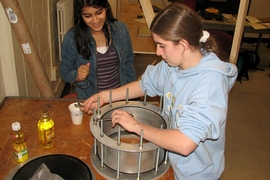An audio documentary produced by nine freshmen has received a 2016 Student Production Award from College Broadcasters, Inc. (CBI). Their piece, “Rebeldes: A Journey Through New Mexican Agriculture,” took first place in the Audio Documentary/Public Affairs category at the National Student Electronic Media Convention in Philadelphia.
The students created the documentary as part of Terrascope Radio, a class offered by the Terrascope freshman learning community. Each year, a cohort of Terrascope freshmen explore a complex problem focused on issues of sustainability and the environment. This particular cohort focused on food security and ways to feed the world’s population over the next century.
The documentary is an engaging and informative look at farmers in a desert landscape, and at how their individual farming styles reflect their personal values. It explores modern industrial farming, centuries-old collective water-distribution organizations, ancient Navajo corn customs, and semi-urban organic farming. First broadcast on WMBR, the piece was then distributed nationwide by the Pacifica Radio Network on its popular “Sprouts” program.
“It’s a fantastic audio story,” says Terrascope Lecturer Ari Epstein, who co-created the class in collaboration with MIT's Comparative Media Studies/Writing. “It’s fun to listen to and creatively made, and it really gives you a sense of the deep, personal connection these farmers have to the work they do. It’s wonderful for the students to have received this national recognition for the high quality of their work.”
Most of the sound used in the program was collected during the 2016 Terrascope Spring Break Field Experience, a trip to New Mexico and the Navajo Nation. The students helped clear debris out of an acequia, a communally controlled irrigation ditch that forms a key component of a centuries-old system of self-government in northern New Mexico; attended Shiprock Ag Days, a conference that brings together farmers, Navajo, and U.S. government officials, agricultural distributors, and others; and picked crops for their own dinner at an organic farm that has been operated by the same family for over 300 years.
Producing the documentary for Terrascope Radio had a deep impact on the students. “For me, I think one of the biggest things I got was a widening of perspective,” says Quint Hester. “Going to New Mexico, it was amazing to get out in the wide open and see all these different farmers and their ways of doing things, and get your hands in the dirt and really see how much they care about it and what it means to them. It was really awesome.”
The mechanics of creating a radio program was just one aspect of the students’ learning curve during the class; the more challenging task, according to Lily Jordan, was working out the kinks involved in collaborating effectively as a group. “The amount of organization and give-and-take that took was definitely really hard at times. But I think it was really helpful in learning how to solve these kinds of open-ended problems and come up with something really big that seems daunting at first,” says Jordan. “If you want to learn how to solve a big, open-ended problem or make a really large creative project, then this kind of experience is really valuable, because that’s how it's going to be in the real world.”
“The students’ experience represents a lot of what Terrascope is all about,” says Epstein. “They worked intensively together, driven by their own passions and curiosity, and they ultimately created something of very high quality that is directly relevant to issues of sustainability, environmental stewardship, and service to humankind. And in the process, they created their own mutually supportive community, which lives on beyond this particular class.”
Terrascope is one of three freshman learning communities administered under the Office of Experiential Learning. The program includes both social and academic components, and it fosters a supportive community in which students participate throughout their time at MIT and beyond.
In addition to Hester and Jordan, the documentary was produced by Laura Bergemann, Milani Chatterji-Len, Mandy Fike, David Olaleye, Kip Stahlecker, Brandon Wang, and Daly Wettermark, with assistance from Undergraduate Teaching Fellow Jake Burga.















